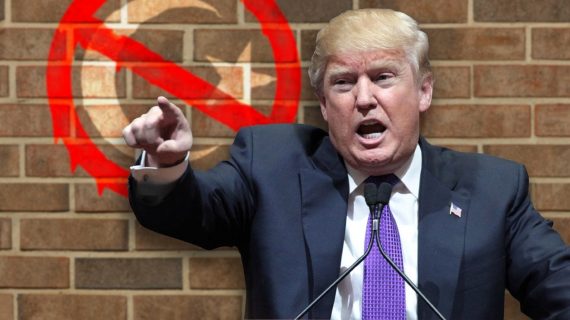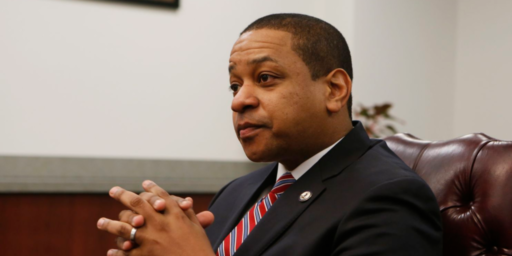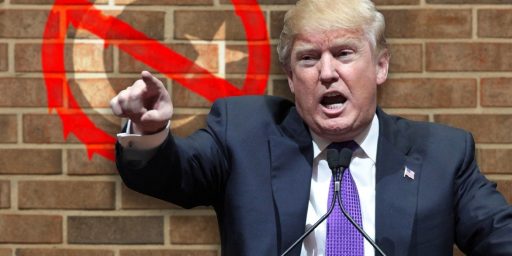Two Federal Courts Block Trump’s Muslim Travel Ban Again
Two Federal Judges have issued orders blocking the latest version of President Trump's Muslim Travel Ban.
Two Federal District Court Judges have issued rulings against the third version of the Muslim Travel Ban that the Trump Administration first sought to implement in the early days of the Administration, only to run into a number of setbacks in Federal Court. The first ruling came from Hawaii, where Judge Derrick T. Watson has blocked most of the provisions of the latest version of the travel ban for many of the same reasons that the first two versions of that ban faced trouble in Federal Court:
President Trump’s attempts to block travelers from a handful of countries — most of them predominantly Muslim — from coming to the United States hit another legal snag on Tuesday, when a federal judge in Hawaii issued a nationwide order freezing most of Mr. Trump’s third travel ban the day before it was to take effect.
At least for now, the judge’s order will prevent the Trump administration from stopping almost all travel to the United States indefinitely from most of the countries named in the ban.
The ban, now in its third iteration, was one of Mr. Trump’s earliest and most controversial decisions after taking office in January, and it has also been one of the most legally troubled. Both previous versions were ordered halted by federal district judges who said they violated the Constitution or exceeded the president’s authority, and those orders were upheld on appeal.
The Supreme Court was scheduled to review the second version of the order when Mr. Trump issued the third. Given the litigation surrounding the travel bans, the Supreme Court seems likely to take an interest in the current version as well.
Citing his campaign promises to keep terrorists and criminals out of the country, Mr. Trump initially ordered an immediate suspension of travel from seven predominantly Muslim countries, a move that plunged airports across the country into confusion and protest in January. That order was eventually blocked by a federal judge in Seattle. Mr. Trump’s second attempt narrowed the scope of the ban, but still struggled to survive judicial scrutiny; it was blocked in March by the same Hawaii judge who issued Tuesday’s order, Derrick K. Watson of Federal District Court in Honolulu.
The third travel ban, Judge Watson wrote on Tuesday, “suffers from precisely the same maladies as its predecessor.” Among those flaws, he wrote, was that the ban “plainly discriminates based on nationality” in a way that undercut “the founding principles of this Nation,” and that the government had not shown that the United States’ national interests would be harmed by admitting travelers from the affected countries.
The Trump administration swiftly denounced the judge’s order, saying that the latest travel restrictions were issued after an “extensive worldwide security review” by Homeland Security officials.
The judge’s order “undercuts the President’s efforts to keep the American people safe and enforce minimum security standards for entry into the United States,” the White House said in a statement. “These restrictions are vital to ensuring that foreign nations comply with the minimum security standards required for the integrity of our immigration system and the security of our nation.” The statement called the ban “lawful and necessary” and expressed confidence that the courts would “swiftly restore its vital protections.”
(…)
Judge Watson’s order blocks the administration from shutting the country’s doors to people from Chad, Iran, Libya, Syria, Yemen and Somalia. It does not prevent the administration from barring North Koreans or Venezuelans or from subjecting Iraqis to stricter scrutiny.
The White House took pains to emphasize that the latest version was extensively vetted, with each of the affected countries subject to its own set of restrictions tailored to its security capabilities. The rollout of the third version of the executive order was supposed to avoid all the chaos of the first one: Legal permanent residents who were barred from the United States under the first travel ban would not be affected by the third, and people who already hold valid visas, including students now in the United States and employees of American businesses, would not have their visas revoked, as could have happened under the earlier ban. (Once their visas expired, however, they would be subject to the ban.)
Administration officials noted that non-Muslim countries were included in the order. But critics of the ban said that the addition of North Koreans and a small number of Venezuelans did little to disguise the ban’s targeting of Muslims.
Judge Watson appeared to find few substantial differences between Mr. Trump’s second effort and his third.
“Professional athletes mirror the federal government in this respect,” he wrote. “They operate within a set of rules, and when one among them forsakes those rules in favor of his own, problems ensue.”
The judge found that the government’s rationale for barring people from certain countries from entering the United States — that doing so would bolster national security — did not make sense, writing that the administration had failed to show a clear link between a person’s nationality and the threat he or she posed.
“The categorical restrictions on entire populations of men, women, and children, based upon nationality, are a poor fit for the issues regarding the sharing of ‘public-safety and terrorism-related information’ that the president identifies,” the judge wrote. Meanwhile, he added, dangerous people of other nationalities could fall outside the scope of the ban: “This leads to absurd results,” he wrote, adding that the executive order was “simultaneously overbroad and underinclusive.”
The judge also said that the order contradicted the administration’s public rationale by applying fewer restrictions to people from Iraq and Venezuela, which the administration said had failed to clear the security standards it had set, than it did on Somalia, which had met the baseline requirements. The administration also provided no coherent explanation for many of the carve-outs for certain categories of people in the ban, such as Iranian students, the judge wrote.
While the administration’s national security goals were important, Judge Watson said, the government had failed to prove that letting people affected by the ban into the country would directly harm the interests of the United States.
Ilya Somin, who has previously expressed doubts about the legality of the latest version of the travel ban, comments on Judge Watson’s decision:
Judge Watson’s ruling follows nearly the same reasoning as the earlier Ninth Circuit decision against Travel Ban 2.0 (which is still on the books, in part because the Supreme Court has not yet dismissed that case, as it has done with the companion Fourth Circuit decision against Travel Ban 2.0). But it seems clear that Judge Watson would have reached much the same conclusion even if the Ninth Circuit ruling was no longer binding precedent. As immigration law scholar Peter Margulies (who believes that Travel Ban 2.0 was legal) explains, the new order is actually more vulnerable to these statutory objections than the old one, because of its more sweeping nature.
Technically, today’s decision is just a preliminary ruling granting a restraining order against enforcement of the travel ban, until the court considers the case further and reaches a final decision on its legality. But it is clear that Judge Watson would almost certainly rule the same way in any final decision. Indeed, one of the criteria for granting the temporary restraining order is whether the plaintiffs are likely to prevail on the merits.
The Hawaii ruling focuses solely on the statutory argument against Travel Ban 3.0, which asserts that the president lacked congressional authorization for his actions. It does not address claims that the new travel ban order is unconstitutional because it is motivated by the president’s desire to discriminate against Muslims, as indicated by his numerous statements to that effect. But Travel Ban 3.0 is vulnerable on this front, as well. This issue, too, is likely to come up as the litigation over the new travel ban continues.
The inclusion of North Korea and Venezuela in the new order is pretty obviously a smokescreen for what remains an effort to target Muslims, with no genuine national security justification. As David Bier of the Cato Institute explains in an excellent post, the administration’s information-sharing rationale for the selection of countries covered by the new order makes no sense, and is internally contradictory.
In addition to Judge Watson’s ruling, a Federal Judge in Maryland has also issued a somewhat less comprehensive order halting most of the provisions of the travel ban:
A federal judge in Maryland early Wednesday issued a second halt on the latest version of President Trump’s travel ban, asserting that the president’s own comments on the campaign trail and on Twitter convinced him that the directive was akin to an unconstitutional Muslim ban.
U.S. District Judge Theodore D. Chuang issued a somewhat less complete halt on the ban than his counterpart in Hawaii did a day earlier, blocking the administration from enforcing the directive only on those who lacked a “bona fide” relationship with a person or entity in the United States, such as family members or some type of professional or other engagement in the United States.
But in some ways, Chuang’s ruling was more personally cutting to Trump, as he said the president’s own words cast his latest attempt to impose a travel blockade as the “inextricable re-animation of the twice-enjoined Muslim ban.”
Omar Jadwat, who directs of the ACLU’s Immigrants’ Rights Project and represented those suing in Maryland over the ban, said: “Like the two versions before it, President Trump’s latest travel ban is still a Muslim ban at its core. And like the two before it, this one is going down to defeat in the courts.”
The third iteration of Trump’s travel ban had been set to go fully into effect early Wednesday, barring various types of travelers from Syria, Libya, Iran, Yemen, Chad, Somalia, North Korea and Venezuela. Even before Chuang’s ruling, though, a federal judge in Hawaii stopped it — at least temporarily — for all of the countries except North Korea and Venezuela.That judge, Derrick K. Watson, blocked the administration from enforcing the measure on anyone from the six countries, not just those with a “bona fide” U.S. tie. But his ruling did not address whether Trump’s intent in imposing the directive was to discriminate against Muslims. He said the president had merely exceeded the authority Congress had given him in immigration law.
The Justice Department already had vowed to appeal Watson’s ruling, which the White House said “undercuts the President’s efforts to keep the American people safe and enforce minimum security standards for entry into the United States.” Both Watson’s temporary restraining order and Chuang’s preliminary injunction are also interim measures, meant to maintain the status quo as the parties continue to argue the case.
(…)
Like Watson’s order, Chuang’s 91-page ruling also found Trump had exceeded his authority under immigration law, but only partially.
The order — which has “no specified end date and no requirement of renewal” — violated a nondiscrimination provision in the law in that it blocked immigrants to the United States based on their nationality, Chuang wrote.But Chuang said he could not determine, as Watson did, that Trump had violated a different part of federal immigration law requiring him to find entry of certain nonimmigrant travelers would be “detrimental” to U.S. interests before blocking them.
But Chuang said he could not determine, as Watson did, that Trump had violated a different part of federal immigration law requiring him to find entry of certain nonimmigrant travelers would be “detrimental” to U.S. interests before blocking them.
(…)
Chuang had pressed challengers at a hearing this week on what the government would have to do to make the new ban legal, and he noted in his ruling that the new directive had changed from the previous iterations. The government, for example, had undertaken a review process before inking the new measure, and had added two non-Muslim majority countries to the banned list.
But Chuang wrote that he was unmoved that government had simply relied on the results of their review, and instead believed they made “certain subjective determinations that resulted in a disproportionate impact on majority-Muslim nations.” He wrote that the government offered “no evidence, even in the form of classified information submitted to the Court, showing an intelligence-based terrorism threat justifying a ban on entire nationalities,” and asserted that even the new measure “generally resembles President Trump’s earlier description of the Muslim ban.”
As noted, these rulings came just one day before the revised indefinite travel ban that the Trump Administration issued at the end of September was set to go into effect. This new order adds significantly to the temporary ban issued in late January which was blocked by a Federal District Court Judge and the Ninth Circuit Court of Appeals had issued injunctions against the order. After those orders, the Administration issued a revised ban that purported to address the problems pointed out in the initial order. That order purported to make certain changes to the bill but was itself struck down both by Federal Judges across the nation and by the Fourth and Ninth Circuit Courts of Appeal. In June, the Supreme Court issued a ruling regarding the Trump Administration’s Executive Order that banned travel from six predominantly Muslim nations that upheld the ban in some respects but also ruled that it could not be applied to all immigrants from these nations. Specifically, the Court ruled that exceptions must be made for people with valid visas, and those with bona fide family or business connections to the United States, although it didn’t specify what it meant by that.
Under this new version of the order, travel to the United States was restricted for virtually everyone from Iran, Libya, Syria, Yemen, Somalia, and Chad, all six of which are majority Muslim nations. Additionally, the order banned travel to the United States by anyone from North Korea and by certain individuals linked to the government of Venezuela. The only exceptions to the ban are people who already had visas, who are citizens or Permanent Residents of the United States, or who have certain bona fide connections to people already in the United States legally. The most notable changes from the previous order is the fact that it added Chad to the list of banned nations notwithstanding the fact that this nation has not been a significant source of terrorism and the fact that the Chadian government has been cooperative with the United States in the fight against Boko Haram and other terror groups in Africa. The other additions to the list, North Korea and Venezuela, meanwhile, clearly seem to be a deliberate diversion given the fact that there is essentially no immigration of any kind from North Korea into the United States and the limits on travel from Venezuela only apply to a handful of people. The clear intent of the ban, then, was to target mainly the majority Muslim nations on the list, as both Judge Watson and Judge Chuang note in their opinions.
The Trump Administration will obviously be appealing both of these decisions, but those appeals will go to the Ninth and Fourth Circuit Courts of Appeal both of which have previously upheld the District Court rulings that Judges Watson and Chuang issued against the second version of the travel ban. While this doesn’t necessarily tell us what the outcome for the new ban will be on appeal, it doesn’t bode well for an Administration that has proved unable to implement a policy that is clearly grounded in religious prejudice rather than national security.
Here’s Judge Watson’s opinion:
Hawaii Et Al v. Trump Et Al TRO by Doug Mataconis on Scribd
And here’s Judge Chuang’s:
IRAP Et Al v. Trump Et Al TRO by Doug Mataconis on Scribd







So much winning…..
@Tony W:
https://www.outsidethebeltway.com/supreme-court-partly-upholds-partly-lifts-stay-on-muslim-travel-ban/#comment-2222797
The narrative up until the Supreme Court told Judge Derrick T. Watson that he is exceeding his authority.
I am sure you will say nothing when the Supreme Court w/ the “stolen Obama Seat” overrules him again.
@Paul L.:
I suppose you’ll be equally silent when Trump’s half-baked “travel ban” has no discernible effect on terrorism.
@Paul L.:
So much whining…
What that judge does may work fine for Hawaii, but other states and areas might disagree with it. I don’t understand how a judge out there can decide things for the whole country.
@Tyrell: Because he is a judge on a Federal bench, not a State one. The Federal Government operates courts in many states to shorten travel time for litigants and petitioners. You get the same advantage in your state so that, if you should have a grievance about something that needs to be decided in a Federal court, your lawyer doesn’t need to go all the way to Washington DC (which I realize is probably significantly closer to you than it is to Honolulu, and so wouldn’t work as much of a hardship) to file your petition.
Now, if you are really asking “why are people in Hawaii petitioning the Federal Government when they aren’t even citizens,” that’s a different question for which I have no answer that would make sense to you.